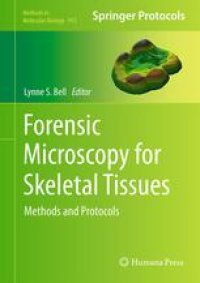
Ebook: Forensic Microscopy for Skeletal Tissues: Methods and Protocols
- Tags: Imaging / Radiology, Biological Microscopy
- Series: Methods in Molecular Biology 915
- Year: 2012
- Publisher: Humana Press
- Edition: 1
- Language: English
- pdf
Forensic anthropology deals with human remains usually in the skeletonized form. The application of microscopy to skeletal tissues is well established and used routinely in biomedical science. Its adaptation to forensic questions is an increasing area of interest, and publications utilizing microscopy have increased in the scientific literature. In Forensic Microscopy for Skeletal Tissues: Methods and Protocols, expert researchers in the forensic, archeological and paleontological disciplines, and detail many of the methods which are now commonly used to study skeletal material. These methods include differing forms of light, confocal, scanning electron and transmission electron microscopy. Written in the highly successful Methods in Molecular Biology™ series format, chapters include introductions to their respective topics, lists of the necessary materials and reagents, step-by-step, readily reproducible laboratory protocols, and key tips on troubleshooting and avoiding known pitfalls.
Authoritative and practical, Forensic Microscopy for Skeletal Tissues: Methods and Protocols bring together differing forms of microscopy that are used in association with forensic anthropology, or have relevance to questions concerning forensic anthropology.
Forensic anthropology deals with human remains usually in the skeletonized form. The application of microscopy to skeletal tissues is well established and used routinely in biomedical science. Its adaptation to forensic questions is an increasing area of interest, and publications utilizing microscopy have increased in the scientific literature. In Forensic Microscopy for Skeletal Tissues: Methods and Protocols, expert researchers in the forensic, archeological and paleontological disciplines, and detail many of the methods which are now commonly used to study skeletal material. These methods include differing forms of light, confocal, scanning electron and transmission electron microscopy. Written in the highly successful Methods in Molecular Biology™ series format, chapters include introductions to their respective topics, lists of the necessary materials and reagents, step-by-step, readily reproducible laboratory protocols, and key tips on troubleshooting and avoiding known pitfalls.
Authoritative and practical, Forensic Microscopy for Skeletal Tissues: Methods and Protocols bring together differing forms of microscopy that are used in association with forensic anthropology, or have relevance to questions concerning forensic anthropology.
Forensic anthropology deals with human remains usually in the skeletonized form. The application of microscopy to skeletal tissues is well established and used routinely in biomedical science. Its adaptation to forensic questions is an increasing area of interest, and publications utilizing microscopy have increased in the scientific literature. In Forensic Microscopy for Skeletal Tissues: Methods and Protocols, expert researchers in the forensic, archeological and paleontological disciplines, and detail many of the methods which are now commonly used to study skeletal material. These methods include differing forms of light, confocal, scanning electron and transmission electron microscopy. Written in the highly successful Methods in Molecular Biology™ series format, chapters include introductions to their respective topics, lists of the necessary materials and reagents, step-by-step, readily reproducible laboratory protocols, and key tips on troubleshooting and avoiding known pitfalls.
Authoritative and practical, Forensic Microscopy for Skeletal Tissues: Methods and Protocols bring together differing forms of microscopy that are used in association with forensic anthropology, or have relevance to questions concerning forensic anthropology.
Content:
Front Matter....Pages i-xii
Back Matter....Pages 1-20
....Pages 21-36